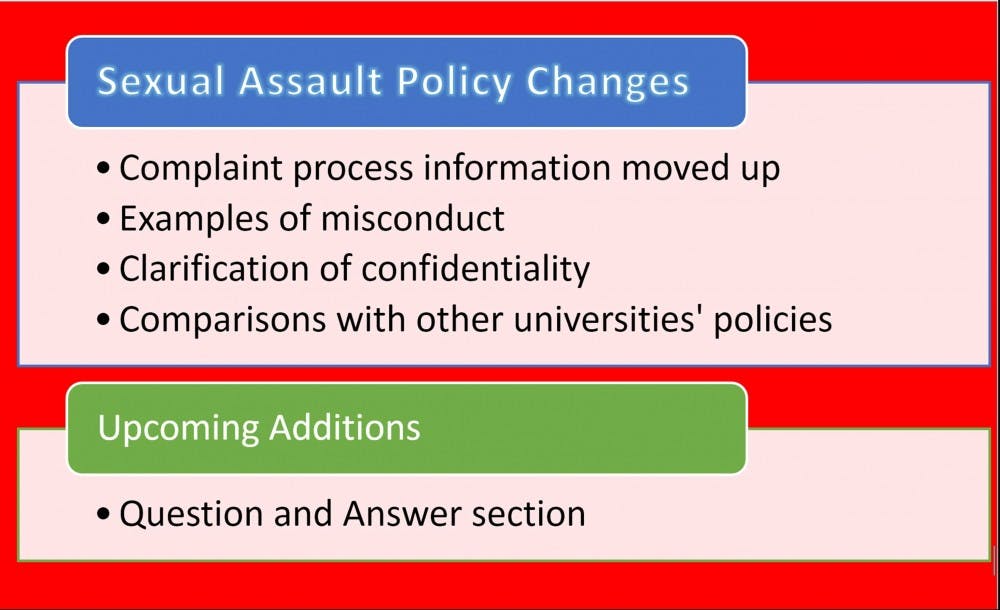Duke’s sexual misconduct policy has been refined to make it clearer and easier for students to utilize.
The changes—announced Aug. 14 in an email from Larry Moneta, vice president for student affairs, to all students—include adjustments to the policy and clarifications to terminology. Several on-campus organizations gave input that was used to make the refinements, including Duke Student Government and the Graduate and Professional School Student Council. Administrators and DSG members said that the aim of the changes is to make it easier to understand how sexual assault complaints are handled.
“We tried to relate [the information] in a way that was logical,” Moneta said. “It’s a clear and cleaner way of laying it out.”
Information for complainants and respondents is now listed in the beginning of the policy so students can find it more easily, Moneta added. He said the refinements also more clearly state that the policy applies to graduate and professional students and includes gender neutral language.
The policy now includes more examples of sexual misconduct and clarifies issues of confidentiality, said Howie Kallem, director of Title IX compliance. He noted that definitions used in the policy were updated as well.
“It now clarifies what kinds of misconduct are covered and who is covered,” Kallem said.
In addition, cross references to other University policies that might apply were added, Kallem noted. He said that a question and answer section—which would clarify procedural issues—is still in the works.
Kallem explained that the refinements were made after the administration received feedback from DSG, GPSC and faculty members that aspects of the policy were unclear. Their suggestions were incorporated before the revisions were presented to a larger group within student affairs that included Moneta, Sue Wasiolek, associate vice president of student affairs and dean of students and Zoila Airall, assistant vice president of student affairs for campus life.
Ilana Weisman, DSG vice president for equity and outreach, said that she spent time last year looking at the policies and trying to find ways to clarify them.
“There was a lot of jargon in it that survivors aren’t going to want to parse through,” she said.
These refinements come less than a year after Duke revised its policies and practices in July 2014 to include more strict definitions of sexual misconduct and consent as well as details about investigation and hearing procedures. Graduate and professional students were then included under the policy as well. The changes were summarized in a website outlining Duke’s commitment to addressing sexual assault which launched before the start of the 2014 fall semester.
However, Moneta noted that this time the policies were not changed as much as the layout was adjusted.
Kallem added that the policy is now more of an educational document, instead of a list of consequences, which informs both complainants and respondents about the process involved in a case of sexual misconduct. He said that this approach is intended to illustrate that the hearing process should be fair and balanced.
“We’re hoping that as we make the process more understandable, it will make it more accessible and that people will be more likely to use it,” he said.
The refinements will assist victims of sexual assault, Weisman said.
“These standards are going to make survivors more comfortable coming forward,” she said.
She noted that the refinements will hopefully increase the number of students who report sexual assault—which happened the last time the policy was revised—and that once that occurs, the number of cases will hopefully go down.
Numerous issues involving sexual assault have affected campus lately, most recently the assault of a female student by a taxi driver early Thursday morning. In addition, a sexual assault claim involving Alpha Delta Phi fraternity—for which no charges will be filed—was raised during the spring semester. In 2014, Duke student Lewis McLeod was found responsible for sexual misconduct by an undergraduate conduct board hearing. He filed a preliminary injunction against the University and is now suing Duke for his diploma. The trial is scheduled to begin in Feb. 2016.
To further reduce issues of sexual assault, the University is launching several new initiatives. These include an online training called “Not Anymore” as well as expanded PACT—Prevent. Act. Challenge. Teach.—training and an increased number of internships at the Women’s Center, Weisman said.
Moneta noted that while the refinements will help clarify the policy, the adjustments are not as critical as these programs.
“Far more important is our continued effort to educate and prevent,” he said.
Correction: This article was updated at 2:40 p.m. to reflect that Kallem said references to other University policies, not other universities' policies, that might apply were added. The Chronicle regrets the error.
Get The Chronicle straight to your inbox
Signup for our weekly newsletter. Cancel at any time.

